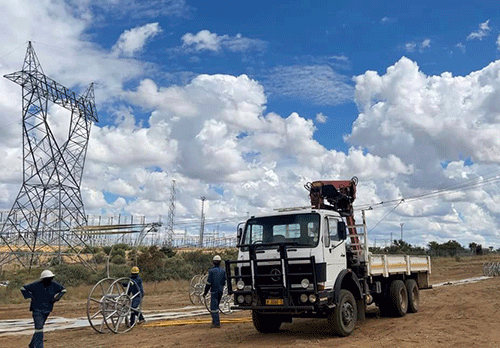NamPower remains adamant it will disconnect the electricity supply of defaulting customers as of 5 June 2023 if those customers fail to honour their debt by the end of this month, but Nored has said it is trying to find a way out of its crisis.
Nored supplies electricity to 90 000 customers in eight northern regions.
Addressing a media briefing earlier this week, NamPower managing director Kahenge Haulofu said the corporation is owed a staggering N$1.5 billion, with N$842 million being overdue. “The announcement is of course not a pleasant one for everyone affected, but it is necessary
as collecting what is owed to us is important for the sustainability of our business and that of the country. Most customers have not bothered to heed our pleas and their debt continues to escalate,” he stressed.
Haulofu said the Northern Regional Electricity Distributor (Nored) is the first RED which will be disconnected in phases due to their unsettled debt.
The MD justified that NamPower offered instalment arrangements to the affected customers, and to their disappointment, this has not yielded the desired results. This is because very few customers are making offers to honour the instalment arrangements to pay their outstanding accounts, hence the reintroduction of the debt-collection plan.
He said NamPower went even further and offered to waive interest charges on overdue accounts settled within a 12-month period, as well as to increase the payment terms of all customers from 14 days to 20 days from the date of invoice.
“We have never had a RED (regional electricity distributor) in serious debt like what we find at Nored. We are looking as to what could be the reason because we believe REDs are the solution. We are proclaiming that REDs should be established in the south to be able to mount skills in order to manage the situation of the southern parts of the country better,” the MD noted.
On Wednesday, Nored said in a press release that they are working towards a solution.
“The matter is receiving utmost attention from the board of directors and management, and engagements with NamPower are ongoing in this regard,” said Nored’s CEO Fillemon Nakashole.
However, the electricity distributor refused to divulge how much it owes the national utility.
Critique on debt collection
Meanwhile, Electricity Control Board (ECB) CEO Robert Kahimise last week stated that NamPower’s debt collection plan should have been implemented more systemically and at much earlier stages to prevent it from threatening the current economic recovery.
“The ECB will engage NamPower to fully understand the implementation process of the plan, and will work with NamPower and the affected licencees to try to find a sustainable solution to the matter,” he continued.
Responding to this critique, Haulofu observed that there have been numerous attempts by NamPower to ensure all bills are paid.
“I don’t think we have failed in any way in collecting our debt,” he rebutted.
Load-shedding
The MD further explained that NamPower currently has two bilateral agreements to import electricity: one with Zambia to import 180 megawatts (MW), and another 80MW from Zimbabwe. The remaining imported power is sourced from South Africa’s Electricity Supply Commission (Eskom).
“We have never received any warning letters from our three suppliers with respect to load-shedding. However, with Eskom, when they are implementing load-shedding in South Africa, they also proportionally load-shed in Namibia”, he continued.
Meanwhile, Cirrus Capital’s Rolland Brown provided some hope via social media that Namibia is not likely to experience load-shedding due to its low demand base. Focusing specifically on energy security, he noted that Namibia’s energy future looks good due to its current efforts, but did not deny the short-term challenges the sector might experience.
Local production
Meanwhile, the Institute for Public Policy Research (IPPR) cautioned that while Namibia is making progress in building new electricity-generating capacity, progress is not fast enough, and will not be sufficient to completely replace imports.
The IPPR stated that this precarious situation is likely to last several years until the end of the decade.
According to the institute, 2022 saw Namibia being more reliant than ever on electricity imports.
“Namibia has long been a net importer of electricity from the Southern African Power Pool (SAPP), and has struggled over the decades to build new domestic generating capacity and become more independent.
Despite greater renewable energy capacity, in 2022, Namibia imported more than 70% of the power required, as power supply from the key Ruacana hydroelectric power station dwindled”, reads the IPPR’s quarterly economic review from January to March
2023.
Overall imports accounted for 71.2% of total electricity supply, making Namibia acutely vulnerable to developments in the rest of the region. The greater dependence on imports has come at a price, causing NamPower to record significant losses in 2022.
Furthermore, NamPower’s operational profitability worsened compared to the previous financial year, with it posting a loss in excess of N$2 billion at both group and company levels.
For the first time in many years, earnings before interest, taxes, depreciation and amortisation (EBIDTA) came out negative, representing a serious blemish on NamPower’s performance scorecard.
The power parastatal recorded an operating loss before net finance income of N$2.3 billion. EBIDTA is used as an indicator of the overall profitability of a business.


